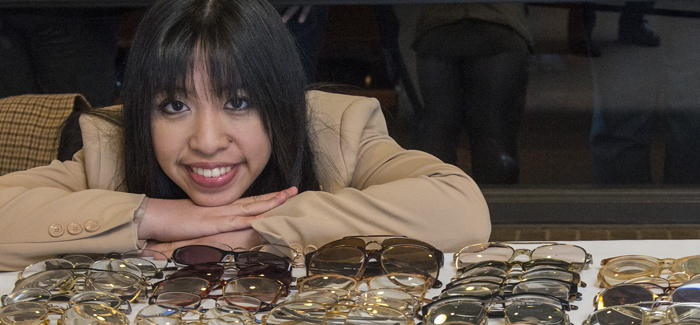
Guzon set her sights high when she founded a nonprofit in high school. (Photography by Robert Kozloff)
Janice Guzon, ’14, will never see perfectly, but she’s focused on helping others.
Macabebe, a fishing town in the Philippines, is home to a winding river, lush greenery, and stately neoclassical churches. In May 2010 the ancient city was also home to a mobile clinic operated by a US-based foundation that offered free vision services.
Late one afternoon, a teenage boy walked into the clinic and tested for a very strong prescription. Asked for his current glasses, the teenager said he didn’t have any; his family couldn’t afford eye care. Unable to read the blackboard, he had never made it through the first grade. Receiving a pair of donated glasses and putting them on—seeing the world clearly for the first time—he began to cry.
The recycled glasses that gave him a new view of the world came from the clinic’s stash of 2,000 pairs collected by EYEsee, a nonprofit founded by Janice Guzon, a third-year in the College. Thirteen time zones away, in Hoffman Estates, Illinois, Guzon also grew up with failing vision. As a high school freshman, she discovered the cause when she was diagnosed with type 1 diabetes. Eyeglasses had always enabled her to live normally, but she didn’t fully appreciate them until 2008, when an aunt in the Philippines wrote asking for money to buy a pair. “Until then,” Guzon says, “I had just kind of taken glasses for granted.”
That summer, at 15, Guzon founded EYEsee, an organization run by college and high school students that collects used eyeglasses in the United States for distribution to poor populations in Haiti, the Philippines, Venezuela, Micronesia, the Congo, and other countries—some 35,000 eyeglasses to date. In January Guzon won Glamour magazine’s first Top Ten College Women Reader’s Choice Contest for her work with EYEsee.
After her aunt’s letter arrived, Guzon did some research and learned that in developing countries, where some families make only $4 a day, a pair of eyeglasses can cost a year’s salary. Meanwhile, Americans discard four million pairs a year. Several US service organizations have eyeglass recycling programs, yet most discarded glasses still wind up in a landfill.
Unable to function without her glasses, Guzon understood the consequences for the productivity and even employability of those who can’t afford them. Recruiting four friends, she started EYEsee with a laptop and a series of meetings at the local library.
Short and slight, with a voice barely above a whisper, Guzon has an unassuming presence. But she galvanized her small team to swiftly build an organization that could collect glasses on a large scale.
Choosing the name and designing a website, logo, and T-shirts, they wrote letters asking churches, schools, senior centers, and other groups to sponsor eyeglass collections. They also asked humanitarian organizations to distribute the glasses overseas (three said yes). They recruited about 50 volunteers and collected 7,000 pairs of eyeglasses, mainly from churches, the first year. With success came credibility and an additional 12 distribution partners as well as more volunteers and collection sites. When eyeglasses arrive, EYEsee measures their prescription strength using a lensometer, labels them, and packages them for distributors. Eyeglasses left over from a distribution trip are inventoried by the partner organization and saved for future use.
Guzon hasn’t had the time or money to go on a trip herself. But the next phase of EYEsee’s long-term strategic plan may take her abroad—the organization wants to establish on-site clinics that will provide year-round ophthalmological care where it is most needed. Guzon, who plans to run EYEsee full time after graduation, hopes to partner with local government and community organizations to start the clinics, and her $1,500 Glamour award will serve as seed money.
A public policy major at the U of C, Guzon has delegated many of EYEsee’s day-to-day tasks to the group’s key corps of volunteers. But she continues to oversee all aspects of the operation, including the annual report, containing data and stories provided by the distributors: lines to receive eyeglasses stretching around city blocks, recipients stunned to find that they can now read their bibles or see their grandchildren’s faces. The glasses, says Guzon, are “helping those most in need.”
